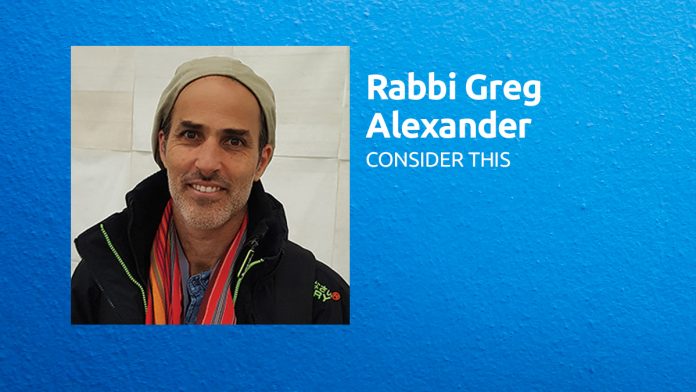By Rabbi Greg Alexander
I have noticed a new catchphrase everyone seems to be throwing into their speech.
It varies from “To be honest,” or “If I’m honest,” to “I have to be honest with you”, and it makes me uneasy every time. I find myself wanting to stop the speaker and ask them why they only decided to be honest with me now, and what they were lying about previously that I would need to be concerned about.
At the same time, I am fully aware that honesty is complicated. After all, sometimes a bit too much honesty is actually not going to help. Take an example from the Talmud. Hillel and Shammai often took opposing positions on matters and so did their students. In one example they are arguing about how to dance before the bride on her wedding day. What do you say to her if she doesn’t look fantastic? The students of Hillel answer that you chant, “she is gorgeous and attractive”, but the students of Shammai point out that the Torah forbids lying. (B.Talmud Ketubot 17a) Who wins? As in most cases of their disagreements, the halachah goes according to Beit Hillel. We choose the white lie to make the bride feel great on her wedding day, which is in itself a mitzvah.
So what happened to honesty then? Well, in certain cases, honesty falls away in the face of the greater need for kindness. Take another example, this one from the Torah. When the angel comes to tell Avraham that Sarah will give birth in her old age, she, overhearing the news, cracks up with laughter, saying to herself, “am I to have enjoyment with me so withered and my husband so old?” (Gen. 18:12). Sarah can’t believe that she and her hubby are going to be able to have a child when they are a couple of wrinklies. But in the next verse, when G-d explains to Avraham that Sarah laughed, the explanation given is that she had laughed because, “shall I give birth to a child as old as I am?” (Gen 18:13) Just “I am”, not “we are”. G@d was not fully honest with Avraham by omitting Sarah’s reference to him being old. When the famous commentator Rashi (11th Century France) explains this, he says that “the Torah altered her statement in the interests of peace.” Mip’nei darkhei shalom — for the sake of peace in their relationship, G-d told a white lie, or at least held back a part of the truth. While honesty is crucial to building trust, it can also destroy trust if it is used without sensitivity.
Let me not give you the impression that honesty is unimportant in Judaism. As the Talmud teaches, “The Holy One of Blessing hates a person who says one thing with their mouth and another in their heart” (B. Talmud Pesachim 113b). It is a mitzvah not to lie, another to have honest business dealings and there is even a mitzvah about misleading someone with words. Geneivat da’at literally means stealing the mind of another person by using inaccurate language or using words to deceive. Think of an estate agent or seller who hid the fact that there was serious damp or a damaged roof in a house for sale. Or a breakfast cereal claiming that it is healthy if it isn’t. Not just misleading adverts or dishonest packaging, but faking your CV, cheating on your matric exams or lying to SARS about your tax returns or making fake insurance claims are all examples of geneivat da’at. Even going into a shop and asking the price of an item or trying it on if you know from the beginning that there is no chance you will buy it is given as an example of this mitzvah (Shulchan Aruch, Choshen Mishpat 228:4).
Being scrupulously honest is a formulative principle in Judaism. Going back to Rashi, he explains that the word for truth, Emet, is made up of the letters aleph, mem and taf because they are the first, middle and last letters of the alef-bet. Truth is therefore to be found everywhere and is the root of everything.
At the same time, while honesty is important, it cannot be at the expense of sensitivity. It is crucial because without it, human beings cannot live together in peace. But in some cases, in order to live in peace, we have to set aside the strictest honesty to protect a person’s feelings. Mipnei darchei shalom — for the sake of the paths of peace. The American philosopher, Wayne W. Dyer said, “If you have the choice between being right and being kind, choose being kind”.
So, the next time you start a sentence with “to be honest with you…” take a moment to check in with yourself. Words are not something we should use without intention. Have I been honest until now? Why not? Do I need to say what I am about to say? Will it hurt or injure unnecessarily? If we use our language more carefully, we can all walk along the paths of peace.
Temple Israel www.templeisrael.co.za
• Published in the PDF edition of the December 2021/January 2022 issue – Click here to get it.
• To advertise in the Cape Jewish Chronicle contact Karyn on 021 464 6700 ext. 104 or email advertising@ctjc.co.za. For more information and advertising rate card click here.
• Sign up for our newsletter and never miss another issue.
• Please support the Cape Jewish Chronicle with a voluntary Subscription for 2022. For payment info click here.
• Visit our Portal to the Jewish Community to see a list of all the Jewish organisations in Cape Town with links to their websites.
Follow the Chronicle: Facebook | Instagram | Twitter | LinkedIn











